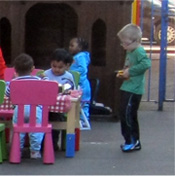01162763377 | enquiries@earlylearnersnurseryschool.co.uk



Information and Records
10.9 Confidentiality and Client Access to Records
'Practitioners need to understand their organisation's position and commitment to information sharing. They need to have confidence in the continued support of their organisation where they have used their professional judgement and shared information professionally.'
Information Sharing: Guidance for Practitioners and Managers (DCSF 2008).
Policy statement
At Early Learners' we recognise that parents have a right to know that the information they share with us will be regarded as confidential, as well as to be informed about the circumstances when, and the reasons why, we are obliged to share information.
We are obliged to share confidential information without authorisation from the person who provided it, or to whom it relates, if it is in the public interest. That is when:
- it is to prevent a crime from being committed or to intervene where one may have been, or to prevent harm to a child or adult; or
- not sharing it could be worse than the outcome of having shared it.
The decision should never be made as an individual, but with the back-up of the management team. The three critical criteria are:
- Where there is evidence that the child is suffering, or is at risk of suffering, significant harm.
- Where there is reasonable cause to believe that a child may be suffering, or is at risk of suffering, significant harm.
- To prevent significant harm arising to children and young people or adults, including the prevention, detection and prosecution of serious crime.
Procedures
Our procedure is based on the seven golden rules for information sharing as set out in Information Sharing: Guidance for Practitioners and Managers (DCSF 2008).
- Remember that the Data Protection Act is not a barrier to sharing information but provides a framework to ensure that personal information about living persons is shared appropriately.
- Our policy and procedures on Information Sharing provide guidance to appropriate sharing of information with external agencies.
- Be open and honest with the person (and/or their family where appropriate) from the outset about why, what, how and with whom information will, or could, be shared, and seek their agreement, unless it is unsafe or inappropriate to do so.
- In our setting we ensure parents receive information about our Information Sharing Policy when starting their child in the setting and that they sign our Registration Form to say that they understand the circumstances in which information may be shared without their consent. This will only be when it is a matter of safeguarding a child or vulnerable adult;
- have information about our Safeguarding Children and Child Protection Policy; and
- have information about the other circumstances when information will be shared with external agencies, for example, with regard to any special needs the child may have or transition to school.
- Seek advice if you are in any doubt, without disclosing the identity of the person where possible.
- Managers contact children’s social care for advice where they have doubts or are unsure.
- Share with consent where appropriate and, where possible, respect the wishes of those who do not consent to share confidential information. You may still share information without consent if, in your judgement, that lack of consent can be overridden in the public interest. You will need to base your judgement on the facts of the case.
- Guidelines for consent are part of this procedure
- Consider safety and well-being: Base your information sharing decisions on considerations of the safety and well-being of the person and others who may be affected by their actions.
- Consider safety and well-beingIn our setting we record concerns and discuss these with the setting’s designated person and/or designated officer from the management committee for child protection matters;
- record decisions made and the reasons why information will be shared and to whom; and
- follow the procedures for reporting concerns and record keeping.: Base your information sharing decisions on considerations of the safety and well-being of the person and others who may be affected by their actions.
- Necessary, proportionate, relevant, accurate, timely and secure: Ensure that the information you share is necessary for the purpose for which you are sharing it, is shared only with those people who need to have it, is accurate and up-to-date, is shared in a timely fashion, and is shared securely.
- Our Safeguarding Children and Child Protection Policy and Children's Records Policy set out how and where information should be recorded and what information should be shared with another agency when making a referral.
- Keep a record of your decision and the reasons for it – whether it is to share information or not. If you decide to share, then record what you have shared, with whom and for what purpose.
- Where information is shared, the reasons for doing so are recorded in the child's file; where it is decided that information is not to be shared that is recorded too.
Consent
Parents have a right to be informed that their consent to share information will be sought in most cases, as well as the kinds of circumstances when their consent may not be sought, or their refusal to give consent may be overridden. We do this as follows:
- Our policies and procedures set out our responsibility regarding gaining consent to share information and when it may not be sought or overridden.
- We may cover this verbally when the child starts or include this in our prospectus.
- Parents sign our Registration Form at registration to say they understand this.
- Parents are asked to give written consent to share information about any additional needs their child may have, or to pass on child development summaries to the next provider/school.
- Copies are given to parents of the forms they sign.
- We consider the following questions when we need to share:
- Is there legitimate purpose to sharing the information?
- Does the information enable the person to be identified?
- Is the information confidential?
- If the information is confidential, do we have consent to share?
- Is there a statutory duty or court order requiring us to share the information?
- If consent is refused, or there are good reasons not to seek consent, is there sufficient public interest for us to share information?
- If the decision is to share, are we sharing the right information in the right way?
- Have we properly recorded our decision?
All the undertakings above are subject to the paramount commitment of the setting, which is to the safety and well-being of the child. Please also see our Safeguarding Children and Child Protection Policy.

